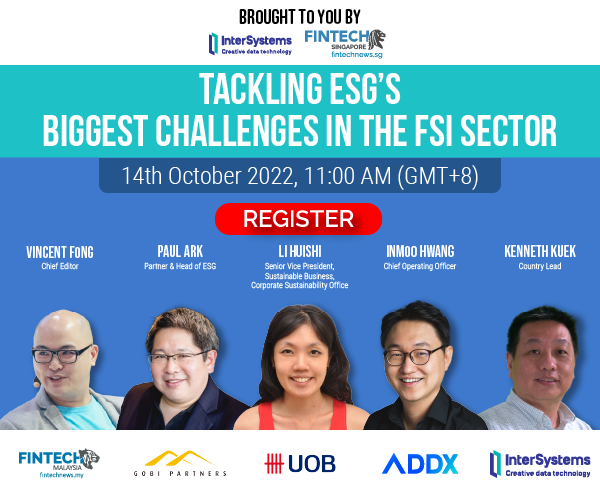Enhancing payments connectivity, digitalizing the financial infrastructure and promoting green finance will be among the main areas of focus for Singapore’s central bank and financial regulator in the years to come.
These priorities were unveiled in the refreshed Financial Services Industry Transformation Map (ITM) 2025, released by the Monetary Authority of Singapore (MAS) earlier this month.
The roadmap sets out the key growth strategies for the sector for this year onward. It strives for the Singaporean finance sector to grow by an average annual rate of 4-5% from 2021 to 2025, create more than 3,000 jobs on average each year, and enable the city state to maintain its position as a leading international financial center in Asia.
Singapore’s Financial Services Industry Transformation Map 2025
The ITM 2025 comprises five key growth strategies.
The first strategy focuses on digitalizing Singapore’s financial infrastructure and promoting the development of digital platforms for improved efficiency in bond issuance, listing and settlement, as well as funds settlement. A digital platform that connects small and medium-sized enterprise (SME) across growth regions, facilitates trade discovery and enables easier access to trading financing for participating SMEs will also be launched.
The second strategy will be centered around enhancing payments connectivity and building an innovative digital asset ecosystem. This will be done by expanding cross-border payment linkages with regional economies and by getting involved in initiatives such as Project Nexus, an effort led by the Bank for International Settlements (BIS) to connect instant payment systems.
MAS will also continue exploring opportunities related to distributed ledger technology (DLT), digital currencies and asset tokenization for use cases like cross-border payments, trade finance and capital markets. Several initiatives, including Project Guardian and Project Orchid, were launched last year to explore these technologies.
The third strategy will focus on catalyzing Asia’s transition towards net-zero, and will see MAS working with the industry to develop solutions to scale up sustainable and transition financing.
Goals will include providing greater clarity on transition activity through, for example, the development of an industry-led taxonomy, facilitating the decarbonization of real economy sectors with financing solutions for corporates, and enhancing sustainability disclosures and building data utilities with efforts like Project Greenprint, a collection of initiatives aimed at harnessing technology and data to enable green and sustainable finance.
To support these sustainability initiatives, the Financial Sector Development Fund (FSDF) administered by MAS will set aside S$100 million grant funding over the next five years for capability building, green fintech, climate risk and reinsurance, and new financing solutions.
The fourth strategy will focus on fostering a skilled and adaptable workforce. This will be done by working closely with the Institute of Banking and Finance (IBF), the financial industry and tripartite partners – the Ministry of Manpower, National Trades Union Congress and Singapore National Employers Federation – to build competencies in key growth areas like sustainability and technology, and make training support available for Singaporean finance professionals at different stages of their careers.
An estimated S$400 million from the FSDF will be channeled to support the Talent and Leaders in Finance program over 2021 – 2025 to nurture more Singaporean specialists and leaders in finance.
Finally, the fifth strategy will focus on helping Singapore enhance asset class strengths and deepen its capabilities in areas such as foreign exchange (FX), insurance, wealth and asset management, private capital markets, and fintech.
Finance sector grew 5.7% per annum between 2016 and 2020; 20,000+ net jobs created
The updated roadmap is built upon its earlier iteration, which was launched in 2017 and focused heavily on innovation and technology adoption, as well as developing the finance and technology workforce.
The ITM 2016-2020 plan had a target of 3,000 net jobs created each year, but exceeded that with an average of 4,100 net jobs being created per annum. Over 20,000 net jobs were created in financial services over the period of 2016 to 2020, Lawrence Wong, Deputy Prime Minister and Minister for Finance, and Deputy Chairman of MAS, said at the launch event of ITM 2025 on September 15. During the period, Singapore’s financial services sector grew by an average of 5.7% each year, surpassing the target of 4.3%.
Singapore, a major fintech hub in Southeast Asia with some 1,000+ companies, has been facing an acute talent shortage in the fintech sector.
Top executives from recruitment agencies Michael Page Singapore, Robert Walters Singapore, JobTech and Randstad Singapore, told Channel News Asia last year that tech talent in the financial industry was in such demand that many candidates receive multiple job offers and are offered salary increments.
Before the pandemic, tech was already an area of supply-demand mismatch, but COVID-19 saw demand surge amid digital transformation projects and a booming fintech industry, said Faiz Modak, Senior Manager for Tech and Transformation at Robert Walters Singapore.
Daljit Sall, Senior Director of Technology at Randstad Singapore, shared that the recruitment agency had seen a rise in demand for talent in digital finance, including fintech services and platforms. He stated that the local tech talent pool wasn’t large enough to meet new business demands, adding that the COVID-19 pandemic had made it difficult to source for talent overseas.
Singapore’s Financial Services Industry Transformation Map 2025 infographic:
Featured image credit: Edited from Unsplash
- ant financial
- blockchain
- blockchain conference fintech
- chime fintech
- coinbase
- coingenius
- crypto conference fintech
- Financial Services Industry Transformation Map (ITM) 2025
- fintech
- fintech app
- fintech innovation
- Fintechnews Singapore
- OpenSea
- PayPal
- paytech
- payway
- plato
- plato ai
- Plato Data Intelligence
- PlatoData
- platogaming
- razorpay
- Revolut
- Ripple
- Singapore
- square fintech
- stripe
- tencent fintech
- various
- xero
- zephyrnet
















